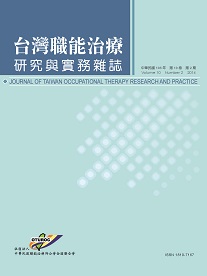Journal of Taiwan Occupational Therapy Research and Practice

半年刊,正常發行
目的:聆聽音樂在近年來已成為腦傷患者之認知復健的新興療法之一,但尚未有明確的證據支持聆聽喜愛音樂對精神分裂症患者之認知功能的效益。由於在精神分裂症患者的各種認知障礙中,注意力和記憶缺失與患者的學習能力和獨立生活功能有密切的相關;故本研究之目的旨在探討自選之喜愛音樂對精神分裂症患者之注意力及記憶力的影響。方法:共計16位精神分裂症個案參與本研究。本研究採受試者內重複量測設計,主要以d2注意力測驗、彩色路徑描繪測驗和聽覺數字記憶廣度測驗檢驗患者在三種不同情境(包括安靜、自選之喜愛音樂以及不喜愛音樂)中的注意力和工作記憶的表現。此外,並以視覺類比刻度尺評量患者由音樂所引發之情緒和警醒程度的改變。結果:研究結果主要發現在喜愛音樂的情境中,受試者所引發之正向情緒和警醒程度顯著較其他兩種情境為高。雖然患者在三種情境之注意力及記憶測驗的分數多未達顯著的差異,但效果量分析顯示喜愛音樂對患者之d2注意力測驗和記憶廣度測驗的逆序背誦部分有正向效果的趨勢,而對其彩色路徑描繪測驗的表現則有負向影響的趨勢。結論:本研究初步發現聆聽喜愛音樂並未對精神分裂症患者的注意力和工作記憶表現產生明顯一致的促進現象,故建議臨床治療師宜謹慎應用音樂於精神分裂症患者的認知功能訓練。
Objective: Listening to music has been recently used as a novel therapeutic tool for cognitive rehabilitation of patients with brain injury. However, few studies have been done in patients with schizophrenia. Deficits in attention and memory are closely related to abilities of learning and independent living in patients with schizophrenia, and therefore the purposes of the study were to investigate whether listening to pleasant music improves attention and memory in patients with schizophrenia. Methods: A within-subject repeated measures designswas used with 19 participants with schizophrenia. All participants were asked to complete the d2 Test of Attention, the Color Trails Test, and the Digit Span Testwhile listening to pleasant music, unpleasant music, or nothing. All conditions and the presentation of the tests were counterbalanced across participants. Visual analogue scales were used to provide self-reported ratings of arousal and mood. Results: Compared with unpleasant music and silence conditions, participants rated their moods as more positive and arousal as higher under pleasant music condition. Although there were no significant effects of condition on the scores of all three tests, the effect sizes reached small to large levels. While listening to pleasant music, participants performed somewhat better on the d2 Attention Test and the backward Digit Span Test, but slightly worse on the Color Trails Test and the forward Digit Span Test. Conclusion: The study revealed inconsistent effects of listening to pleasant music on attention and memory performance in patients with schizophrenia. Our findings suggest that clinical application of listening to music in cognitive rehabilitation may be cautious in patients with schizophrenia.












